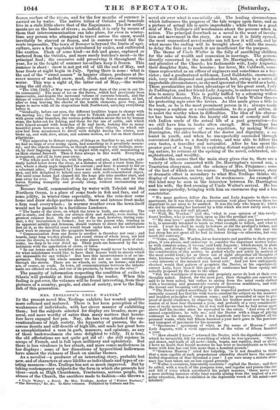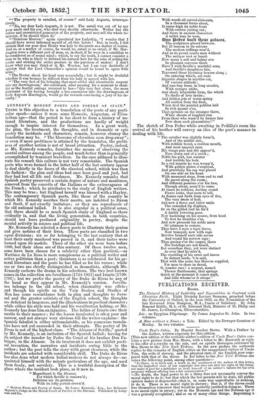MRS. TROLLOPE'S "UNCLE WALTER..
IN the present novel Mrs. Trollope exhibits her wonted qualities more softened and matured. There is her keen perception of the weaknesses of individuals, with her clever manner of exhibiting them; but the subjects selected for display are broader, more ge- neral, and more worthy of satire than many matters that hereto- fore have engaged her pen. Nay, she has even attacked the con- ventionalisms of high society, the hypocrisy of parsons, the de- corous deceits and self-deceits of high life, and made her great hero as unsophisticated a man in garb, manners, and opinions, as any of those backwoodsmen she once delighted to vilify. It is true, the old affectations are not quite got rid of : she still rejoices in scraps of French, and is full upon millinery and upholstery. But there is less virulence in her attack, and more comic mellowness in her displays : some of her dissections of hypocritical hollowness have almost the richness of Hook on similar themes.
As a novelist—a producer of an interesting story, probable but new, and of characters at once lifelike as individuals and types of ex- isting manners—Mrs. Trollope has not so much improved. But by taking contemporary subjects for the form in which she presents her ideas—such as High Churchmen, Tractarians, serious people, the abuses of the Church, the sacrifices made to fashion—she throws a
• Uncle Walter; a Novel. By Mrs. Trollope, Author of "Father Eustace," "The Barnabys," &c. &c. In three volumes. Published by Coburn and Co.
novel air over what is essentially old. The leading circumstance which influences the progress of the tale verges upon farce, and as a picture of actual life is quite improbable ; while there is a good deal of Mrs. Trollope's old woodenness about the persons when in action. The principal drawback as a novel is the want of involu- tion and movement in the story. As soon as it is fairly opened, the most unpractised novel-reader can tell how it will end, and by what means the ending will be brought about ; while the means to delay the finis or to reach it are insufficient for the purpose. The theme of Uncle Walter is the folly of sacrificing children for the sake of wealth and connexion in marriage. The persons direotly concerned in the match are Dr. Harrington, a dignitary and pluralist of the Church ; his fashionable wife, Lady Augusta ; their daughter Kate, the heroine; her lover, Mr. Caldwell, some- times represented as an officer of engineers and sometimes as a bar- rister; and a goodnatured nobleman, Lord Goldstable, enormously rich, very well-disposed and goodnatured, but, owing to a series of improbable circumstances, as shy and ionorant of the world as a baby. These peculiarities are taken advantage of by his great aunt, Lady de Paddington, and her friend Lady Augusta, to endeavour to induce him to marry Kate. This is partly baffled by a scheming widow of doubtful character, Mrs. Fitzjames, while Uncle Walter throws his protecting aegis over the lovers. As this uncle gives a title to the book, so he is the most prominent person in it; always ready to expose a sophism or a conventionalism, to do a good action, or to assist the worthy when in difficulties. The idea of his charac- ter has been taken from the hearty old man of comedy and the rich Indian uncle of the actual life of a past generation—for we still have him in books often enough. Mrs. Trollope has avoided the appearance of mere repetition, by making Walter Harrington, the elder brother of the doctor and dignitary, a co- lonist in youth, and when he unexpectedly succeeded through convenient deaths to a family estate, and was able to follow his own tastes, a traveller and naturalist. After he has spent the greater part of a long life in exploring distant regions and study- ing nature, he returns at the opening of the novel, celebrated, un- sophisticated, and wealthy. Besides the scenes that the main story gives rise to, there are a variety of others connected with Dr. Harrington's second son, a Tractarian clergyman, and the schemes of Mrs. Fitzjames; some of the last of which are too coarse. Throughout, however, story or dramatic effect is secondary to what Mrs. Trollope thinks the display of character, society, and its weaknesses. An example of this kind may be seen in the interview between Dr. Harrington and his wife, the first evening of Uncle Walter's arrival He has come unexpectedly, bringing with him an enormous dog and a boa constrictor.
"We must perforce follow the Doctor and Lady Augusta to their own apartment, for it was there that a conversation took place between them toe important to our story to be omitted. It was the lady who began it; which she did by addressing her husband by a title which she now rarely used, ex- cept when she was not well pleased.
" ' Well, Mr. Warden !' said she, ' what is your opinion of this newly- found brother, who is come back upon us like the prodigal son ? ' " ' My dear love !' quoth the Doctor, ' the parable, since you have referred to it, is assuredly intended to teach us what example to follow, and what to avoid. I trust we shall be ready to behave as did the prodigal's father, and not as his brother. More especially, Lady Augusta, as in this case the lost sheep has not spent all he had in riotous living—or otherwise, but very much the contrary.'
" Come, come, Mr. Warden, let us leave texts and parables to their proper place, if you please, and endeavour to consider the important matter before us with common sense, if we can,' said Lady Augusta ; which meant, in plain English, and divested of the ordinary decencies of expression, 'Let us, in the consideration of this matter, be guided wholly and solely by motives of the most sordid kind ; let us throw out of sight altogether all thoughts of duty, kindness, or brotherly affection, and look entirely at our own interests —our interests of the meanest and lowest sort.' And yet how unfeignedly shocked would that pattern of propriety the Doctor, or his superlativelv correct Lady, have been if this species of conference had been openly and nakedly proposed by the one to the other.
"But the worshipers of decency and propriety never do look at their own thoughts naked. Indeed, for the most part, their thoughts can scarcely be said to be born naked, but rather to spring from the mind ready clothed with a becoming and presentable vesture of decorous semblance, and with the decent and becoming veil of proper phraseology.
"The Doctor replied accordingly to his respected partner's harangue, and earnestly, assured her that his wish was to consider the subject on the soundest and broadest principles of common sense ; and he proceeded at once to give proof of docile obedience, by observing that his brother must now be in pos- session of at least four thousand a year, and probably of a very considerable sum of ready money besides ; for it was well known that he had never spent above half his income since he succeeded to the estate. And even of that annual expenditure, he tells me,' said the Doctor with a tinge of pitying contempt in his manner, 'that a few hundreds only have supplied all his personal wants, while full fifteen hundred a year have gone in the purchase and transport of specimens for his museum.' " 'Specimens ! specimens of what, in the name of Heaven ?' cried Lady Augusta, with a vivid appreciation of the value of fifteen hundred a year.
" How should I know !' returned the Doctor, with the dignified contempt which he invariably felt for everything of which he was ignorant. Sticks, and stones, and trash of all sorts—birds, beasts, and reptiles, dead or alive ! I have no doubt that horrid monster he has been so inconsiderate as to bring home with him has cost him more than a hundred pounds.' " Gracious Heaven !' cried her ladyship, 'is it not dreadful to think that a man capable of such preposterous absurdity should have the uncon- trolled disposition of four thousand a year ! I am sure many a statute of lu- nacy has been taken out on less cogent grounds.'
"Walter is eccentric, lamentably eccentric replied the Doctor; and then he added, with a touch of the pompous tone, and regular and piston-like rise and fall of voice which constituted his pulpit manner, 'there never was a more striking instance of the fatal results arising from the neglect of a re- gular education, than is exhibited in the deplorable wreck of his mind—and intellect.'
" The property is entailed, of course ?' said Lady Augusta, interroga- tively. No, my dear Lady Augusta, it is not. The entail was cut oft' by my poor uncle and his son, who died very shortly afterwards. Walter has the
entire and unrestricted of the property, and may sell the whole to- morrow, if he should think fit.' "'Gracious Heaven!' again ejaculated her Ladyship, wonder that I should have never informed myself of all this before ! But, in truth, I felt certain that our poor dear Henry was heir to the estate as a matter of course. And so, as a matter of course, he would be, entail or no entail, if Mr. Har- rington were a different sort of man, or, in short, if he were in a condition to be considered as of sound mind ; which, to say the truth, I cannot consider a man to be who is likely to defraud his natural heir for the sake of selling his estate and sinking the entire produce in the purchase of snakes! I don't know what you may think of it, Mr. Warden, but I am very decidedly of opinion that the lord Chancellor's opinion would be found to agree with mine.'
"The Doctor shook his head very mournfully ; but it might be doubtful whether it was because he differed from his lady or agreed with her.
"'The very fact of his bringing that most awful and abominable serpent into my drawingroom,' she continued, after pausing for a moment to shud- der as-the fearful outrage recurred to her—' this very fact alone,. the mere statement of his having brought a boa constrictor into the drawingroom of Lady Augusta Harrington, would go far towards convincing a jury of his in- sanity.



























 Previous page
Previous page